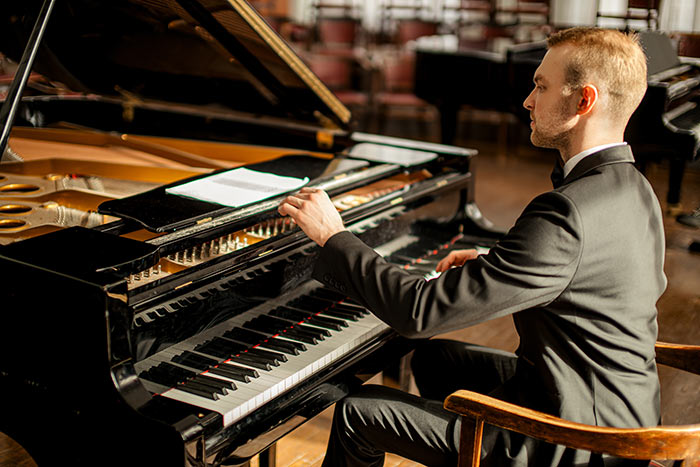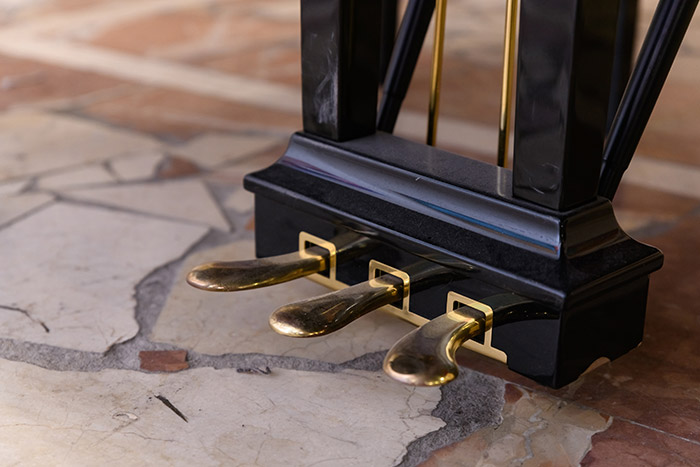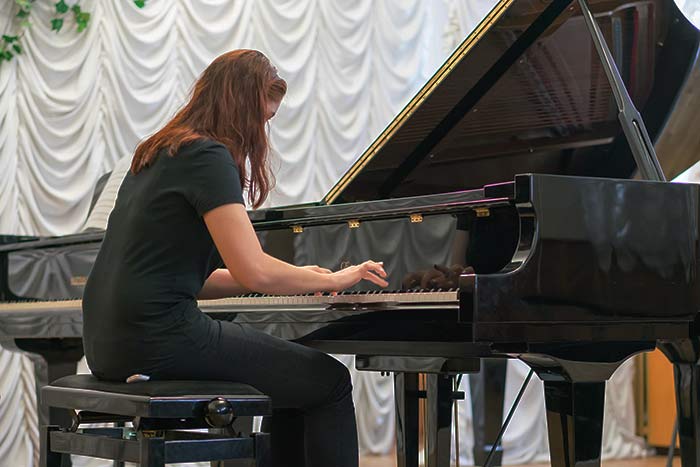Embarking on a piano journey is a thrilling endeavour, yet it comes with its share of challenges. From tedious practise sessions to self-doubt and frustration, it’s natural to lose motivation and enthusiasm. However, maintaining motivation is essential for long-term progress and achieving your goals.
Here are some innovative tips to keep your piano journey inspiring and engaging:
Musician’s Journaling
Start a musician’s journal where you jot down your thoughts, feelings, and inspirations before and after each practise session. Reflecting on your musical journey can deepen your connection to the music and provide valuable insights into your progress. Write about what you’re working on, what challenges you’re facing, and what you’re proud of. This reflective practise can help you identify areas for improvement, track your progress, and celebrate your achievements.
In your journal, you can also include notes on your favourite pieces, composers, or performances. You can write about the emotions and stories behind the music, or explore the historical context in which it was written. This deeper understanding of the music can help you connect with it on a more emotional level and inspire your playing.
As you reflect on your musical journey, consider the following questions:
- What are your short-term and long-term goals for your piano practise?
- What motivates you to continue practising?
- What challenges do you face, and how do you plan to overcome them?
- What are your strengths and weaknesses as a pianist?
- How do you plan to stay inspired and motivated throughout your journey?
By reflecting on these questions, you’ll gain a deeper understanding of your musical journey and develop a clear plan for achieving your goals.
Piano Challenges
Create personalised challenges to spice up your practise routine. Whether it’s learning a piece in a different style, memorising a complex passage, or improvising over a chord progression, these challenges can add excitement and creativity to your practise sessions.
Challenge yourself to master a new technique, play with different dynamics, or experiment with different articulations. By setting specific goals and challenges, you’ll stay motivated and engaged.
You can also set up mini-challenges for yourself, such as playing a piece without mistakes for a certain number of times, or improving your sight-reading skills by a certain percentage. These small victories can give you a sense of accomplishment and boost your confidence.
For example, if you’re working on a piece that requires complex finger work, challenge yourself to play it without looking at the sheet music for 30 seconds. Or, if you’re struggling with a particular section of the piece, challenge yourself to play it perfectly 10 times in a row.
Digital Collaborations
Embrace technology to collaborate with other musicians virtually. Join online communities or social media groups where you can share recordings of your playing and receive feedback from fellow pianists. Collaborating with others can offer new perspectives, inspire creativity, and provide accountability.
You can also participate in online master classes or workshops, where you can learn from experienced pianists and instructors.
By connecting with other musicians online, you’ll gain access to new resources, inspiration, and support. You’ll also have the opportunity to learn from others’ experiences and share your own knowledge and expertise.
Visual Metronome
Experiment with a visual metronome app or device that provides visual cues like flashing lights or moving graphics.
This multi-sensory approach can enhance your sense of rhythm and make practise sessions more dynamic and engaging. Visual metronomes can help you develop a stronger sense of timing and coordination, which is essential for playing with precision and accuracy.
You can also use visual metronomes to improve your sense of metre and tempo. For example, you can use the app to display the rhythmic pattern of a piece in real-time, allowing you to internalise the rhythm more easily.
Piano and Alexander Technique
The Alexander Technique is a holistic approach to improving posture, balance, and overall movement, developed by Frederick Matthias Alexander in the early 20th century. The technique focuses on re-educating the body to move freely, efficiently, and with minimal tension. This approach has many benefits, including reducing stress, improving performance, and enhancing overall well-being.
Piano playing requires precise coordination, control, and relaxation of the fingers, hands, arms, and entire body. The Alexander Technique can help pianists develop a more efficient and effective playing technique by relaxing and releasing unnecessary tension in their bodies, improving posture and alignment, and enhancing coordination and control.
By focusing on efficient movement patterns and releasing tension, pianists can improve their hand-eye coordination, finger dexterity, and overall control over their playing. This integration can lead to improved technical facility, enhanced musical expression, reduced risk of injury, increased confidence, and better overall well-being.
If you’re interested in learning more about how the Alexander Technique can benefit musicians like pianists, read the article, “Why Alexander Technique lessons are vital for musicians“, here.
Reverse Learning
Try a reverse learning approach by starting at the end of a piece and working your way backward. This unconventional method challenges your brain to think in new ways and can deepen your understanding of the piece’s structure and phrasing. Reverse learning can also help you develop a stronger sense of musicality and phrasing.
For example, if you’re working on a piece that has a complex ending, try starting at the end and working backward. You can focus on the intricate finger work or complex rhythms required at the end of the piece, and then work your way back to the beginning.
Piano Meditation
Use your piano practise as a form of meditation by focusing solely on the sounds and sensations of playing. Let go of expectations and immerse yourself in the experience of making music. This mindful approach can bring a sense of peace and relaxation to your practise sessions.
Meditation can also help you quiet your mind and reduce distractions, allowing you to focus more intensely on your playing. You can use guided meditation recordings or simply focus on the sensation of your fingers on the keys.
Interval Training
Implement interval training into your practise routine by alternating between intense practise sessions and periods of rest or reflection. This structured approach can maximise your productivity and prevent burnout. Interval training can also help you develop a stronger sense of focus and concentration.
For example, you can set up an interval training schedule where you practise for 30 minutes, followed by 10 minutes of rest or reflection. You can repeat this process several times throughout the day, allowing you to take breaks while still making progress.
Multi-Instrument Exploration
Expand your musical horizons by learning to play other instruments alongside the piano. Experimenting with different instruments can stimulate creativity and offer new insights into music theory and composition. Playing multiple instruments can also help you develop a stronger sense of musicality and appreciation for different genres.
By exploring different instruments, you’ll gain a deeper understanding of music theory and composition. You’ll also be able to apply new techniques and skills to your piano playing.
Piano Gamification
Turn your practise sessions into a game by setting up challenges, earning points for completing goals, or competing against yourself or others.
Adding an element of competition or gamification can make practise more engaging and enjoyable.
You can set up reward systems, track your progress, or challenge yourself to complete specific tasks within a certain timeframe. For example, you can set up a reward system where you earn points
for completing certain tasks, such as mastering a new piece or improving your sight-reading skills.
Final thoughts….
By incorporating these innovative tips into your piano practice routine, you’ll be able to stay motivated and inspired throughout your journey. Remember that staying inspired is an ongoing process that requires creativity, flexibility, and persistence.
Don’t be afraid to try new things and step outside your comfort zone. With these tips, you’ll be well-equipped to overcome obstacles and achieve your goals as a pianist.
Maintaining motivation is essential for long-term progress as a pianist. By incorporating these innovative tips into your practice routine, you’ll be able to stay inspired and engaged throughout your journey.
Remember that staying inspired is an ongoing process that requires creativity, flexibility and discipline!












